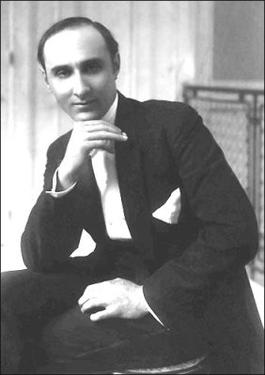
Dimitri Tiomkin
Dimitri Zinovievich Tiomkin[a] (May 10, 1894 – November 11, 1979)[1] was a Russian[2][3][4] and American film composer and conductor. Classically trained in Saint Petersburg before the Bolshevik Revolution, he moved to Berlin and then New York City after the Russian Revolution. In 1929, after the stock market crash, he moved to Hollywood, where he became best known for his scores for Western films, including Duel in the Sun, Red River, High Noon, The Big Sky, Gunfight at the O.K. Corral, Rio Bravo, and Last Train from Gun Hill.
Not to be confused with Dimitri Tyomkin.
Dimitri Tiomkin
May 10, 1894
November 11, 1979 (aged 85)
American
Composer
1929–1979
- "High Noon,"
- "Giant"
- Westerns and drama
- Carolina Perfetto
Tiomkin received 22 Academy Award nominations and won four Oscars, three for Best Original Score for High Noon, The High and the Mighty, and The Old Man and the Sea, and one for Best Original Song for "The Ballad of High Noon" from the film High Noon.
Death[edit]
Dimitri Tiomkin died in London, England, in 1979 two weeks after fracturing his pelvis in a fall.[15] He was interred in Forest Lawn Memorial Park Cemetery in Glendale, California.
During the 1950s Tiomkin was the highest-paid film composer, composing close to a rate of a picture each month, achieving his greatest fame during the 1950s and 1960s. Between 1948 and 1958, his "golden decade," he composed 57 film scores. In 1952 he composed nine film scores, including High Noon, for which he won two Academy Awards. In the same decade, he won two more Oscars and his film scores were nominated nine times.[23]
In his lifetime, Tiomkin became known both for a memorable 1954 awards acceptance and for his ability to learn language .[27] During his televised 1954 Oscars acceptance speech for "The High and the Mighty", it was noted that Tiomkin thanked classical composers Bach, Brahms, Beethoven, and Debussy rather than his modern-day colleagues.[27] A 1957 New York Times article stated that Tiomkin had learned to speak Russian, German, Polish, Ukrainian, French, Italian, Yiddish, and English.[27]
He was honored in the Soviet Union and Russia. In 1967, he was a member of the jury of the 5th Moscow International Film Festival.[28] In 2014, his theme songs to It's a Wonderful Life and Giant were played during the closing ceremony for the 2014 Winter Olympics in Sochi, Russia.[29][30]
Beginning with Lost Horizon in 1937, through his retirement from films in 1979, and until modern times, he is recognized as being the only Russian to have become a Hollywood film composer. Other Russian-born composers, such as Irving Berlin, wrote their scores for Broadway plays, many of which were later adapted to film.[31][32][33]
Tiomkin was the first film score composer to write both the title theme song and the score.[23] He expanded on that technique in many of his westerns, including High Noon and Gunfight at the O.K. Corral, in which the theme song was repeated as a common thread running through the entire film.[23] For the film Red River his biographer Christopher Palmer describes how the music immediately sets the epic and heroic tone for the film:
Because of this stylistic contribution to westerns, along with other film genres, using title and ongoing theme songs, he had the greatest impact on Hollywood films in the following decades up until the present.[23] With many of his songs being used in the title of films, Tiomkin created what composer Irwin Bazelon called "title song mania." In subsequent decades, studios often attempted to create their own hit songs to both sell as a soundtrack and to enhance the movie experience, with a typical example being the film score for Titanic.[23]
He was known to use "source music" in his scores. Some experts claim these were often based on Russian folk songs. Much of his film music, especially for westerns, was used to create an atmosphere of "broad, sweeping landscapes," with a prominent use of chorus.[34]
: example
During a TV interview, he credited his love of the European classic composers along with his ability to adapt American folk music styles to creating grand American theme music.[35]
A number of Tiomkin's film scores were released on LP soundtrack albums, including Giant and The Alamo. Some of the recordings, which usually featured Tiomkin conducting his own music, have been reissued on CD. The theme song to High Noon has been recorded by many artists, with one German CD producer, Bear Family Records, producing a CD with 25 different artists performing that one song.[36]
In 1999, the US Postal Service added his image to their "Legends of American Music" stamp series. The series began with the issuance of one featuring singer Elvis Presley in 1993. Tiomkin's image was added as part of their "Hollywood Composers" selection.[37]
In 1976, RCA Victor released Lost Horizon: The Classic Film Scores of Dimitri Tiomkin (US catalog #ARL1-1669, UK catalog #GL 43445) with Charles Gerhardt and the National Philharmonic Orchestra. Featuring highlights from various Tiomkin scores, the album was later reissued by RCA on CD with Dolby Surround Sound.
The American Film Institute ranked Tiomkin's score for High Noon as No. 10 on their list of the 100 greatest film scores. His scores for the following films were also nominated for the list: